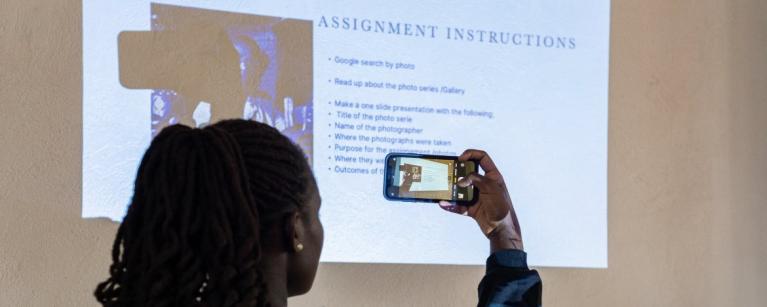Art is not only beautiful, it is also a form of self-expression or even activism. The latter is what we call artivism. From films to literature and paintings, they denounce social problems in an approachable way. Our Stories 4 Change program brings together young creatives from Uganda, South Africa, Bangladesh, Cambodia and the Philippines. They learn to turn their stories into prose, podcasts, photos or art. So that their fellow countrymen and women and the rest of the world can also learn about them. We take a look at the project in Uganda.
Stories 4 Change Uganda
The energy is palpable at the cozy office of FOTEA, Oxfam Novib's partner organization. Today a writing workshop is on the program. Creative people from all over the country enthusiastically participate and exchange ideas. They have been selected from as many as 160 applications. After a week of intensive workshops, 15 lucky ones advance to the final round, which is a six-month multimedia group project. Selection is difficult every time for Stella Nantongo, co-director at FOTEA. "These workshops are a great opportunity, especially for young people from outside of Kampala, where these opportunities are more rare. These days are a source of inspiration for them."
Changing views of the world
Why is it so important to tell stories in the first place, whether with words or paint? According to Stella, stories can change a person's view of the world. "Sometimes a topic may seem very complex or distant. Climate change, for example. But then suddenly you see a cartoon in the newspaper that shows the heart of the problem. Then it suddenly hits you. And then you realize: this is actually very important and also concerns me personally." That is also the goal of the participants. Each has their own story that they want to share with the rest of the world.
Social topics
One of the topics discussed during the brainstorming session: opportunities and obstacles for children with disabilities in Uganda. On paper, everything is well organized, but practice proves very different. Many children cannot attend school because these institutions do not take their physical or mental disability into account. The few good schools are often too far or too expensive for parents, especially if they live in rural areas. But things aren't much better in the capital either. Kampala's largest university campus, for example, is not even completely wheelchair-friendly. No change will come if no one knows about it. And so these young people are telling the story.
Back to basics
The participants are already creative. That is why they learn other skills during the training, such as doing (field) research. Stella: "Many participants have a creative idea and start immediately. They are self-taught and there is absolutely nothing wrong with that. But, during the training they learn the importance of a good foundation and research. You can't talk about a topic like physical disability without knowing the facts. That's why we say: read up; hit the streets; immerse yourself in the subject." Ethics are also covered in the training. Stella: "You do have to ask the people you photograph for permission first. That's the basics."
Working together for a better world
With the Stories4Change project, we give young people a stage so that their stories are heard. Because young people are the future. So it is important to involve them in our fight for a fair and inclusive world. We also strengthen the voices and opportunities of young people with other projects, from Pakistan to Nigeria. With our trainings, for example, young people have a better chance in the labor market. Or we help companies develop internships and traineeships, with fair wages and good working conditions. All these projects are possible thanks to our loyal supporters. Thank you for that!
